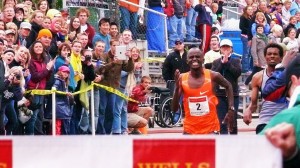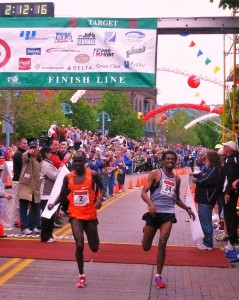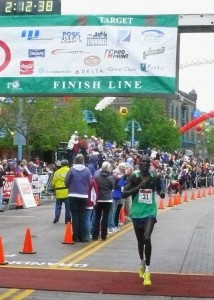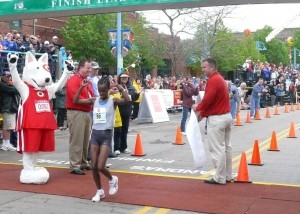Kenyan wins closest Grandma’s finish
By John Gilbert
Christopher Kipyego expressed confidence before Grandma’s Marathon that he would win. He said he was confident that he’d win all through the 26.2-mile run down the North Shore, and even in the final steps, after he passed Teklu Deneke on the Canal Park Drive homestretch. Then he took his final step in the race, and only then was he unsure of himself.
“It was so close at the finish that I didn’t know I had won,” said Kipyego, 37, who is from Kenya but now splits his time between his homeland and Zacatecas, Mexico.
Incredibly, Kipyego and Deneke, 31, who is from Ethiopia, hit the finish line side-by-side, step-for-step. Both were credited with unofficial times of 2 hours, 12 minutes, 17 seconds. Race officials immediately declared Kipyego the winner, but it took some time before Kipyego’s official time was listed as 2:12:16.36, to Deneke’s 2:12:16.56 — a margin of two-tenths of a second.
In 1999, Andrew Musava beat Tesfaye Bekele by 4 seconds, which was the record for a close finish until Saturday’s finish. After spending more than 2 hours running 26.2 miles, a margin of 4 seconds seems miniscule. But it seemed enormous once this year’s finish was inscribed in the books.
Those lining the streets could see this would be a close finish, but even those near the finish line couldn’t have anticipated the way the final 30 yards unfolded. If you didn’t know better, you’d think that Kipyego had decided on his own to make the 2011 Grandma’s Marathon the closest finish possible. Having passed Deneke as the two made the final turn, under a decorative arch to come down Canal Park Drive, Kipyego had pulled ahead by a couple of strides.
Then he hesitated, misidentifying the finish line. “I stopped early, because I thought the finish line was 20 meters before,” said Kipyego, who mistook the lines of the timing pad for the finish. “Right away, I saw people up ahead at the finish line, so I went again.”

Two strides from the tape, Chris Kipyego, left, of Kenya strained to hold off Ethiopia's Teklu Deneke.
The 5-foot-6, 123-pound Kipyego recovered in an instant, but he had lost his momentum, while Deneke caught up. A photo taken two strides from the finish showed Deneke just behind Kipyego’s left elbow, but a photo shot just across the finish line showed them exactly side-by-side. In the photo finish, Kipyego’s left shoulder hit the banner and his left foot crossed the line just before Deneke by the slimmest of margins. Had the finish line been two strides farther, Deneke would have won.
Race director Scott Keenan chased after Kipyego to inform him he had won. It was his first victory in a U.S. marathon for Kipyego, who ran his fastest time. “I’m improving,” smiled Kipyego. “I did my best today, at 2:12:17. My best before was 2:12:56.”
Deneke was philosophical about coming so close. “I’m disappointed, but happy with second,” he said. “Only one person wins every race, and I thought I could win this one. You go to every race thinking you can win. We got down to four of us running together in the lead group, and everyone wants to win, so everyone picks up the pace. With one mile to go, I was still thinking of winning, and I was pushing hard the last mile. But I also know I did my best.”
Except for a brief stretch midway through the race, when American Jeff Eggleston, 26, of Flagstaff, Ariz., surprised a leading group of 10 East Africans by catching them from behind and taking the lead for about two miles, it was apparent that this would be another in what has become a traditional victory parade for runners from Kenya. Only Minnesota native Brian Raabe’s surprising victory two years ago broke a string of 15 consecutive triumphs by foreign runners, and 11 of those have been from Kenya.
In fact , Kipyego said “I knew about this race in Kenya before I came here,” noting that Grandma’s is known as a race in the United States that welcomes Kenyan runners. Seven of the 10 runners who led most of the race were from Kenya, and the other three from Ethiopia. The neighboring East African nations have a culture of running distances as the most logical mode of transportation, outside the towns, and while they are rivals, they are friendly and respectful rivals, although Kipyago hadn’t met Deneke until Friday night, at the Radisson Hotel.
“Yesterday, I talked to this guy at the hotel, and he’s a good guy,” said Kipyego, who now splits his time residing with his wife and young son between Kenya and Mexico. “I didn’t know how good he was, and I was surprised when he was in the lead group with us. We didn’t talk during the race.”
He said he’d learned something from each of his four previous attempts at Grandma’s Marathon. His learning reached a peak last year, when he was in the lead of a three-man cluster as they cruised down Superior Street. But when they got to Fifth Avenue West, where the course makes a 90-degree turn down the hill to the harbor, countryman Philemon Kemboi made a third-to-first pass and won, leaving Kipyego second. Kemboi ran into visa problems and was unable to return to defend his title, which may have boosted Kipyego’s confidence.
“This is my fifth Grandma’s, and I know the course,” he said. “My first time here, it was too hot, and I crashed — I collapsed at the finish line. I improved my time in my second Grandma’s, but last year I didn’t improve, so I changed my training a little, and I was more careful in the race.”
The race started near Two Harbors in rainy, dreary conditions, and temperatures didn’t climb as high as 50 until the race was over. The rain subsided, but conditions were less than ideal for the spectators who annually line Highway 61 and London Road and Superior Streeet in Duluth. Nor were they favorable for the East African runners who prefer it much hotter. The cool weather prompted better times and more endurance from many of the runners, but not all of them.
“This was too cold,” Kipyego said, with a smile, as he tugged on the skin on his wrist. “I’m too thin. I had to run the first hour and a half just to get warm.”
After Eggleston caught the leaders at Mile 18, he was unable to sustain his impressive pace and eventually took fifth. But Eggleston, who finished second in the Twin Cities Marathon two years ago, had an impact on the lead group, which quickened its pace. Sammy Malakwen, another Kenya runner, who placed third, moved ahead as the leaders neared Lemon Drop Hill, at 27th Avenue East and London Road, although he couldn’t pull away from Kipyego and Deneke.
“A different guy would come up and push, which was really good,” said Malakwen. “I started to take the lead on London Road, and I tried to push, push, push. But when I came up the hill, I could feel my muscles tightening. When we came under the bridge for the last stretch, I was 50 meters behind the two leaders. By that time, I was so exhausted and my muscles were cramping, so I knew I had no chance to win. But I had a good view of their finish.”
Kipyego and Malakwen both list Eldoret as their home city in Kenya, and Kipyego said many runners go to Eldoret to train. Kipyego, who won the $10,000 first-place money as well as $1,500 in incentive money from his sub-2:13 time, returned to Zacatecas, Mexico, the day after the marathon, just in time for his son’s third birthday. He said he spends about three months in Mexico, then returns to Kenya to live and train for about three months, where his mother lives on a farm.
“It is our culture to be born not in town,” he said.
It also is Kenya’s culture to run. Kipyego said when he was younger, he ran other track events. “I used to run 800 meters in Kenya, and my best time was a 1:48 when I was 19,” he said. “I ran 3:43 in the 1500, and 3:59 in the mile.”
I asked Kipyego if he had ever run a 200-meter dash, and he said no. I suggested that might have been good practice, because the closest finish in Grandma’s Marathon came down to a 200-meter sprint. He laughed, and agreed. With a little more practice, he could execute his closing 200-meter sprint without the hesitation near the finish line. You’ve heard of “false starts,” but Kipyego won after a “false finish.”
DELELECHA WINS WOMEN’S CROWN
Yihunlish Bekele Delelecha, 29, from Ethiopia, had less drama winning the women’s division by almost a full minute, with a 2:30:39 time to runnerup Everlyne Lagat’s 2:31:32. A group of three women runners pulled ahead of their challengers, but Delelecha got away and won handily over Lagat and third-place Dot McMahan, from Rochester Hills, Mich.
“We were in a group of three at about 19 miles, and then I tried to pull ahead,” said Delelecha, deciding on the move when she suspected her rivals were tiring. “I heard their breath, and that gave me confidence. After I got ahead, I looked back and my lead was about 50 meters. I changed my pace several times. I’d look back, and if I thought anyone was getting closer, I could go faster.”
When asked if anyone ever got close enough to make her speed up, Delelecha smiled and shook her head. She said she spends some time in Washington, D.C., but for nine months she lives in Albuquerque, N.M., “because the weather is similar to Ethiopia.”
The weather along the North Shore Saturday definitely was not similar to the heat of Ethiopia. “It is much cooler here, but good for running,” said Delelecha, who has run, and won, only two marathons this year — Pittsburgh and Grandma’s.
NOTES:Â Eggleston, who was fifth, and sixth-place Matthew Gabrielson of St. Louis Park were the top U.S. runners in the men’s marathon…Third-place Dot McMahan, a Wisconsin native whose parents live in Aitkin, was the top U.S. women’s finisher, and Jennifer Houck, from Wright, and a former St. Scholastica runner now living in Bloomington, placed fifth as the top Minnesotan.
While nobody threatened Dick Beardsley’s 30-year-old record of 2:09 for the full marathon, the top eight finishers in the men’s Garry Bjorklund Half-Marathon were under the 2002 record. Derese Deniboba Rashaw won in 1:02:19, starting the day of close finishes by narrowly edging Tesfaye Alemayehu, who clocked 1:02:22, and third-place Fernando Cabada, at 1:02:32. The old record was 1:04:19, set by Ryan Meissen.
Saul Mendoza, of Wimberly, Texas, won his second straight wheelchair marathon and seventh altogether, but never had a closer call than Saturday, when his 1:28:53.4 inched ahead of runner-up Jorge Jimenez, from Spain, who was a half-second back at 1:28:53.9. Mendoza looked a little like an auto racer at the finish as he inched ahead of Jimenez and then sort of casually wheeled over in an effective blocking position to the finish…Amanda McGrory, 25, of Champaign, Ill., won her fifth Grandma’s female wheelchair class in the last six years and shattered her course record by nearly seven seconds. McGrory, who won four straight before not competing in last year’s Grandma’s, clocked a 1:39:30 to erase the record she set in 2007 at 1:46:29.
Comments
Tell me what you're thinking...
and oh, if you want a pic to show with your comment, go get a gravatar!





 John Gilbert is a lifetime Minnesotan and career journalist, specializing in cars and sports during and since spending 30 years at the Minneapolis Tribune, now the Star Tribune. More recently, he has continued translating the high-tech world of autos and sharing his passionate insights as a freelance writer/photographer/broadcaster. A member of the prestigious North American Car and Truck of the Year jury since 1993. John can be heard Monday-Friday from 9-11am on 610 KDAL(www.kdal610.com) on the "John Gilbert Show," and writes a column in the Duluth Reader.
John Gilbert is a lifetime Minnesotan and career journalist, specializing in cars and sports during and since spending 30 years at the Minneapolis Tribune, now the Star Tribune. More recently, he has continued translating the high-tech world of autos and sharing his passionate insights as a freelance writer/photographer/broadcaster. A member of the prestigious North American Car and Truck of the Year jury since 1993. John can be heard Monday-Friday from 9-11am on 610 KDAL(www.kdal610.com) on the "John Gilbert Show," and writes a column in the Duluth Reader.